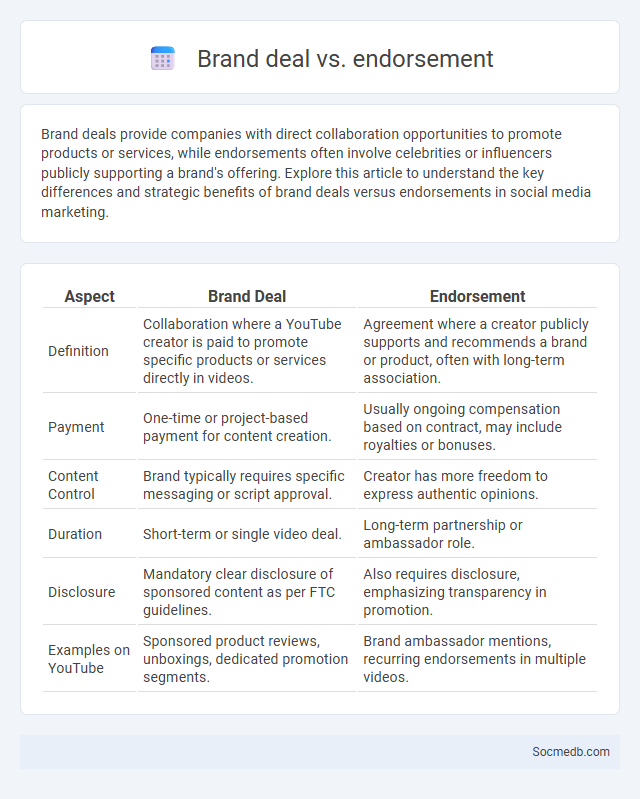
Photo illustration: Brand deal vs Endorsement
Brand deals provide companies with direct collaboration opportunities to promote products or services, while endorsements often involve celebrities or influencers publicly supporting a brand's offering. Explore this article to understand the key differences and strategic benefits of brand deals versus endorsements in social media marketing.
Table of Comparison
| Aspect | Brand Deal | Endorsement |
|---|---|---|
| Definition | Collaboration where a YouTube creator is paid to promote specific products or services directly in videos. | Agreement where a creator publicly supports and recommends a brand or product, often with long-term association. |
| Payment | One-time or project-based payment for content creation. | Usually ongoing compensation based on contract, may include royalties or bonuses. |
| Content Control | Brand typically requires specific messaging or script approval. | Creator has more freedom to express authentic opinions. |
| Duration | Short-term or single video deal. | Long-term partnership or ambassador role. |
| Disclosure | Mandatory clear disclosure of sponsored content as per FTC guidelines. | Also requires disclosure, emphasizing transparency in promotion. |
| Examples on YouTube | Sponsored product reviews, unboxings, dedicated promotion segments. | Brand ambassador mentions, recurring endorsements in multiple videos. |
Understanding Brand Deals: A Comprehensive Overview
Brand deals involve collaborations between influencers and companies where You promote products or services in exchange for compensation, often through sponsored content on platforms like Instagram, TikTok, or YouTube. Understanding key terms such as deliverables, usage rights, and disclosure guidelines is crucial for negotiating fair contracts and maintaining transparency with your audience. Successful brand deals require aligning your personal brand with the partner's values and ensuring measurable goals like engagement rates and conversion metrics are clearly defined.
What Is an Endorsement? Key Characteristics Explained
An endorsement in social media is a public declaration of support or approval for a product, service, or brand, often made by influencers or satisfied customers. It typically involves authentic content that reflects genuine experiences, enhancing credibility and trust among Your audience. Key characteristics include the influencer's relevance to the target market, transparency about the partnership, and the measurable impact on engagement and conversions.
Brand Deals vs. Endorsements: Core Differences
Brand deals involve direct partnerships where companies pay you for promoting their products through specific campaigns, often with defined deliverables and timelines. Endorsements are broader, long-term agreements where your name or image is used to imply credibility and trust, often allowing more flexibility in how you promote the brand. Understanding these core differences helps you negotiate better terms and align collaborations with your personal brand strategy.
Objectives of Brand Partnerships: Deal vs. Endorsement
Brand partnerships in social media aim to either establish long-term collaborations (deals) or leverage influencer endorsements for immediate impact. Deal partnerships focus on strategic alignment, co-creating content, and shared brand growth, while endorsements prioritize authentic promotion through trusted voices to boost credibility and reach. Understanding the objective helps brands optimize campaign outcomes, balancing brand affinity and conversion metrics.
Contractual Obligations in Brand Deals and Endorsements
Contractual obligations in brand deals and endorsements on social media require influencers to adhere strictly to agreed-upon content guidelines, posting schedules, and disclosure requirements to maintain transparency and legal compliance. Brands often stipulate specific deliverables, usage rights, and non-compete clauses to protect their intellectual property and marketing interests. Failure to meet these obligations can lead to contract termination, financial penalties, or legal disputes, emphasizing the importance of clear terms and mutual understanding in influencer marketing agreements.
Influencer Roles: Brand Deal vs. Endorsement
Influencer roles in social media often distinguish between brand deals and endorsements, where brand deals involve paid collaborations with specific deliverables and campaign goals. Endorsements typically reflect an influencer's genuine support, often less formal and can include using or recommending a product without direct compensation. Your success depends on understanding how each role aligns with your audience's trust and the authenticity of your promotion.
Payment Structures: How Compensation Differs
Social media platforms offer diverse payment structures, including cost-per-click (CPC), cost-per-impression (CPM), and cost-per-action (CPA) models, each influencing influencer earnings differently. Sponsored content and brand partnerships typically provide fixed fees or performance-based bonuses, while affiliate marketing on social media relies on commission percentages tied to sales conversions. Platforms like Instagram, YouTube, and TikTok have distinct monetization policies, affecting how creators are compensated based on engagement metrics and audience reach.
Legal and Ethical Considerations
Social media platforms require strict adherence to legal and ethical standards, including compliance with data privacy laws such as the GDPR and CCPA. Your online activity must respect intellectual property rights and avoid defamation or misinformation to maintain trust and avoid legal repercussions. Ethical use of social media also involves transparent communication and safeguarding user data to promote a responsible digital environment.
Measuring ROI: Brand Deals versus Endorsements
Measuring ROI in social media marketing requires differentiating between brand deals and endorsements, as brand deals often have clear metrics tied to specific campaigns, including engagement rates, click-throughs, and conversions. Endorsements, however, rely more on long-term brand affinity and influencer credibility, making ROI evaluation dependent on brand sentiment analysis and audience reach over time. Accurate ROI assessment combines quantitative data from analytics platforms with qualitative insights from consumer feedback and brand loyalty indicators.
Choosing the Right Strategy for Your Brand
Selecting the right social media strategy for your brand involves analyzing your target audience's preferences, engagement habits, and platform trends to maximize reach and impact. Tailored content that aligns with your brand identity and leverages data-driven insights ensures consistent growth and brand loyalty. Prioritize platforms where your audience is most active and refine your approach based on performance metrics to achieve measurable results.
 socmedb.com
socmedb.com